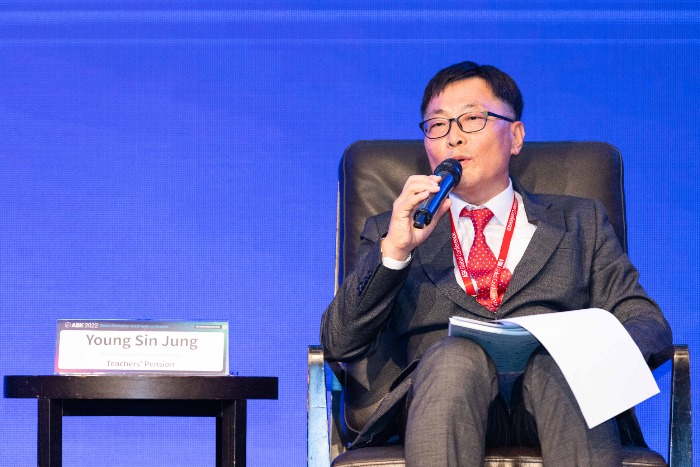Teachers' Pension continues focus on global residential, logistics
The retirement pension seeks more non-core than core real estate, alternative investment head says
By Oct 26, 2022 (Gmt+09:00)
LG Chem to sell water filter business to Glenwood PE for $692 million


Kyobo Life poised to buy Japan’s SBI Group-owned savings bank


KT&G eyes overseas M&A after rejecting activist fund's offer


StockX in merger talks with Naver’s online reseller Kream


Mirae Asset to be named Korea Post’s core real estate fund operator



South Korea’s Teachers’ Pension (TP) will continue its focus on residential and logistics in global real estate investments next year, the pension fund’s alternative investment head Jeong Young-sin said during ASK 2022 on Oct. 26, The Korea Economic Daily’s biannual forum on alternative investments.
The retirement pension pursues more non-core strategies than core ones in its mid-term real estate investment plan, but it will consider the balance between the two strategies in its overall portfolio, Jeong added.
TP is a pension fund for Korean private school teachers and employees. It manages 22 trillion won ($15.3 billion) including alternative assets making up 25% as of end-September. Real estate accounts for 7% of its whole assets, targeting a return rate of more than 5%.
On its overseas real estate investment this year, TP overweighted in non-core assets with a mid-to-long-term plan, Jeong said. The pension fund’s main strategies were global debt and opportunistic for core and non-core real estate, respectively, he added.
So far this year, TP looked for global top-tier investment managers’ blind pool funds due to travel restrictions for onsite due diligence, Jeong said.
He added the pension scheme focused on re-up investment, which is to increase corporate management’s fully diluted shareholdings and shrink external investors’ holdings, as well as funds with diversified regions and sectors.
Unlike some Korean institutional investors, TP doesn't employ foreign exchange hedging strategies for hard currencies like the US dollar and euro, Jeong said. He sees that currency hedging effects for real assets tend to be offset during periods of investments and exits, normally around 10 years.
The pension fund is trying to monitor its global real estate portfolio by region and sector, but it is not easy to manage an alternative investment portfolio via top-down investing, which is focusing on macroeconomic factors for capital deployment.
TP will continue to invest in global GPs’ flagship diversified funds, as well as gradually expand partnerships with managers focusing on specific regions or sectors.
It is also possible to consider increasing secondary funds investment, but the pension fund will take more time before approaching real estate investment trusts (REITs), Jeong said.
Write to Jihyun Kim at snowy@hankyung.com
Jennifer Nicholson-Breen edited this article.
-
 ASK 2022Teachers' Pension eyes direct lending, PE with low leverage
ASK 2022Teachers' Pension eyes direct lending, PE with low leverageMay 19, 2022 (Gmt+09:00)
2 Min read -
 Pension fundsTeachers' Pension posts record-high 12% return in 2021
Pension fundsTeachers' Pension posts record-high 12% return in 2021Feb 06, 2022 (Gmt+09:00)
2 Min read -
 Pension fundsTeachers' Pension to sharply up direct global stock investment
Pension fundsTeachers' Pension to sharply up direct global stock investmentNov 04, 2021 (Gmt+09:00)
3 Min read -

-
 Pension fundsTeachers' fund nets about $155 mn from Aberdeen's PPP projects
Pension fundsTeachers' fund nets about $155 mn from Aberdeen's PPP projectsJun 14, 2021 (Gmt+09:00)
2 Min read


